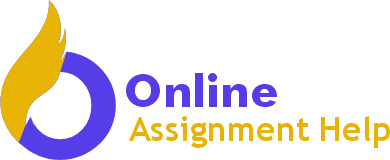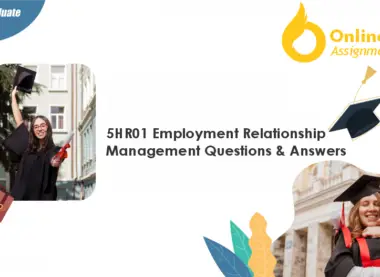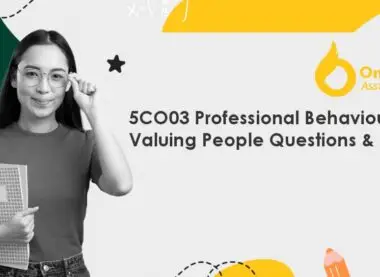5C001 is a unit that examines the role of professionals in understanding the organisational structure and culture in the broader world of work. Learners pursuing the unit will learn of the current trends influencing business and professional operations. 5C001 is a core unit meant to help learners understand the value of change and improved work performance by evaluating people’s behaviours and well-being.
Learning outcomes and unit assessment criteria
By the end of the unit, learners will have understood the following concepts assessed at the end of the learning unit.
- Understand the connections between organisational structures, strategies developed in the organisation and the environment where businesses operate.
- Understand the concept of organisational culture and issues influencing the behaviours of people at work.
- Understand the concept of people practice and how it supports the achievement of people and organisational goals and objectives.
Connections between structures, strategies and business environment
Organisational structures
Organisations are formed with different structures such as the Small and Medium Enterprises (SMEs), public and private organisations, Non-Government Organisations (NGOs), voluntary and international organisations. These different types of organisations have different customers, produce and sell different products and services, and intend to accomplish different purposes. Learners are expected to explain the disadvantages and disadvantages of each in order to pass the assessment criteria.
Organisational strategy
Learners get insight on shaping organisational strategies within the different organisational structures. They have to understand how strategies relate to the external factors influencing business operations. Strategies developed should be in line with the products and services produced in the business, connect to customers, and have the capability to enhance revenue production. To effectively develop organisational strategies, learners should be able to analyse the external trends affecting business. This is possible when using tools such as PESTLE (political, economic, social, technological, legal, and environmental) to understand how the issues impact organisation operations.
Additionally, learners should be aware of the organisational issues impacting performance and culture. Among these issues include the organisation infrastructure, possibilities of expansion, labour force, technological developments, shifting to or introducing new products in business and the customer and staff initiatives. Understanding these issues helps in developing strategies effective to improve organisational performance and attainment of organisational competitive advantage.
People practices impact in organisations
People practice refers to people’s expertise in understanding work and the need for change. It is an approach that considers how people engage and relate with different practices to support the organisation. Learners should learn the impact that people practices have on the systems and structures of organisations. This helps determine the capabilities of the organisational workforce in meeting organisational goals and objectives.
Technology and impacts on work
Learners should understand the value of technology on organisational systems and equipment needed to achieve success. Technology plays a significant role in completing different organisational tasks towards creating organisational improvement and well-recognised performance. Learners also learn the impacts of technology, among them being the developing of new products and services, improvement in worker efficiency, promoting work-life balance, creativity and innovation and improvement in the management of remote workers.
Culture and people’s behaviours at work
Theories of human behaviour
Learners pursuing the unit will gain knowledge on the models and theories of human behaviours. Among the models that the students will learn include group dynamics, high-performance organisations theory, systems theory, team performance, motivation theory, management and leadership theory, and the supportive and collegial models that govern people behaviours.
Drivers for change and change models
This section will help learners understand why change is crucial to organisations, reasons for change and the need for professionals to support employees when introducing and implementing change in the organisations. People experience change differently, and therefore, learners will have to understand the stages in Kubler –Ross model, the coping cycle, Spencer and Adams model that explains the seven stages to understanding change, and the Tannenbaum and Hanna three-stage model. The models to managing change include Kotter’s change model and Lewin’s three-step change model. Learners will also learn about planned and emergent change, radical change, levers for change, the internal environment impact to creating change and the drivers that contribute to significant changes in the organisation.
Creating positive culture through diversity and inclusion
Learners taking this unit should understand the value of respecting other people’s differences and allowing them to participate and engage in work practices equally. This is an aspect that contributes significantly to developing a positive culture in the organisation. Organisations that respect, appreciate differences and value all people equally benefit from shared beliefs that support improved organisational performance, opportunities for the employees to air their concerns, employee involvement in learning and development of policies and practices supporting improved organisational performance.
Relating people practices on organisational culture and behaviour
Professionals have the responsibility to set behaviours that form the culture in the organisation. People practices determine the policies and actions in the organisation that help shape people’s behaviours, beliefs and values. For example, people practices determine openness and trust among employees and between the employers and employees. Learners should understand their role as professionals in developing people practice policies that enhance effective management of the organisation and the people working in that particular organisation.
Employee well-being
Well-being is a concept that has a significant impact on individuals and organisations as well. Focusing on employee well-being creates positive contributions to work and results in improved performance. Learners should understand the value of well-being by engaging in activities that support employee mental and psychological health, focus on improving an individual’s self-image, improve engagement levels at work and enhancing management of family issues.
People practice support in achieving business goals and objectives
Relationships between employee lifecycle and work
Learners are guided to understand the concept of the employee lifecycle from the initial stage of attracting employees to their exit from the organisation. People professionals have different roles to play in the lifecycle stages, and their roles evolve in the changing world of work. There are links realised between the concept of people practices and other organisational areas. For example, HR may connect with organisational strategies to improve business operations and support organisational goals. The current trends in organisations and HR evolve to shape people practices. Through this, professionals learn of the different challenges facing organisations and people. They then work on developing solutions to support people engagement to work and subsequent improvement in organisational performance. Again on supporting improved people practices to enhance the achievement of organisational goals, learners will gain insight into how they should engage with customers and get into consultation with them to address their needs. This creates a good platform where learners understand the need to create an environment where communication and understanding of stakeholders’ needs contribute to achieving organisational goals.
Planning is fundamental to support the achievement of organisational goals and strategies. Therefore, learners should understand how to develop planning strategies to follow the milestones and steps to enhance that the strategies are effectively developed and realised. The planning process should seek to achieve specific organisational goals, which in turn support improved business performance.






